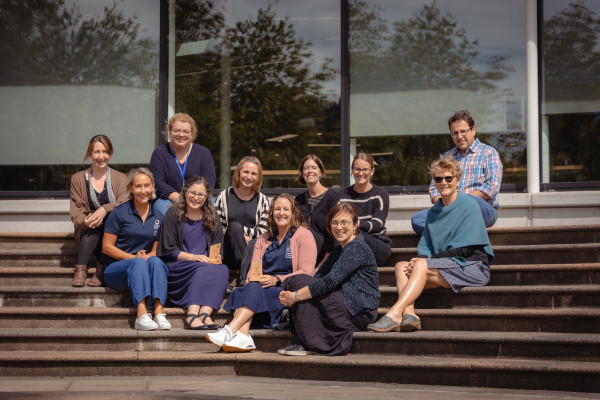- Tūhono home Hoki ki Tūhono
-
- Staff Directory
- Chief Executive Office Auckland International Office Corporate Services Finance Campus Services Functions and Catering Information Systems and Support Marketing, Communications and Engagement Learner Journey Academic Registry International Learner Services Te Punaka Ōwheo
- Learner Experience Academic Excellence Central Campus College of Community Development and Personal Wellbeing College of Engineering, Construction and Living Sciences College of Health College of Work Based Learning Open Education Resource/OERu Research and Postgraduate Studies Te Maru Pumanawa | College of Creative Practice and Enterprise
- Māori Development and Kaitohutohu Office People, Culture & Safety People and Culture Childcare Centre Te Ama Ako | Learning and Teaching Development Wellbeing and Safety Auckland Staff Directory Executive Office Academic Corporate Services Marketing and Business Development Human Resources Campus Quality and Programme Development
-
 Our people make a better world
Our people make a better world
We build the capabilities of individuals, organisations and communities and help them to realise their potential.
Staff Directory
-
- Tools
- Academic Integrity Declaration Form AIC Applications Dashboard Approved Programmes Approved Programme Fees Centralised Assessement Repository Chemwatch CMS - Tūhono & StudentHub updates Course Evaluation and Surveys CRM Applications CRM customer service hub Delegations policy/process Disability and Neurodiversity Dynamics 365 (CRM) EBS Ontrack EBS Report Email Security Personal Portal Employment Matters / Solarworkplace / Performance Reviews eTaxi eTV
- Financial Variance Reporting Hidden Disabilities Sunflower programme FCM travel intranet InPlace International entry requirements Knowledgebase articles Learner Support Dashboards Linkedin Learning Log a job with Marketing Login as an applicant Microsoft 365 Moderation App Moodle OP Docs OP Docs - Publishing OP Image Libraries Performance Excellence Portal Product Evaluation Panel
- Policy Library Privacy Programme and Course Design and Development Qualtrics XM RDS Remote Access Support Portal Research Database Robertson Library Staff FAQs about Graduation Status of Programmes Student Hub (Kāpehu demonstration view) Study Abroad info for learners Tūhauora I Wellbeing resources Uniprint Vault Webexpenses Auckland Tools
-
 Vault
Had an accident or near miss?
Log it here
Vault
Had an accident or near miss?
Log it here
-
- Communities
- Community AI Steering Committee Ally Network EBS Community of Interest EdTech Champions Health & Wellbeing Research Internal Evaluation Neurodiversity Professional Team Professoriate Proud@OP Student Support Website Advisory Group Web Champions Working under the Rainbow Project Learner Capability Trade Training Centre
- Committee Academic Committee Animals@OP Diversity and Equity Doctor of Professional Practice Committee Kaunihera Whakahaere - Leadership Council Internal Evaluation Learning & Teaching Leadership Team Library Committee Mental Health and Wellbeing Advisory Group Otago Polytechnic Board of Directors Pastoral Care Code Committee Programme Approvals Committee Research and Postgraduate Committee Research Ethics Committee Staff Subcommittee
- Think Tanks Mātauraka Our learners achieve educational success Pūtea Our financial success Tākata Our people, our team, our community Tiriti Our active commitment as a Treaty partner Tūroa Our commitment to be a sustainable and responsive organisation
-
 Create a community
Create a community
Do you have a community, committee or project that you'd like represented here?
Communities
-
- About OP
- Keep up to date All news All events All notices All blogs Share your info Create a news article Create an event Create a notice Create a blog
- Community and Partnerships Alumni and friends Education Foundation Operational information Academic calendar 2025 Academic calendar 2026 Current vacancies Dunedin campus map Our policies Topical FAQs
- Who we are About OP Commemorative sites Māori Strategic Framework Merchandise OP Our history Our strategic priorities Pasifika Strategic Framework (2025-2030) Vision and Values Working for us OP job opportunities Wellbeing Calendar Working at OP
-
New Zealand: 0800 762 786
contact us
International: +64 3 477 3014
Older men’s falls risk and confidence in completing activities of daily living: A retrospective cohort study
Author: Kimberley Burr
Supervisors: Yvonne Thomas Laura Hogue
Burr, K. (2022). Older men’s falls risk and confidence in completing activities of daily living: A retrospective cohort study (Unpublished document submitted in partial fulfilment of the requirements for the degree of Master of Occupational Therapy). Otago Polytechnic | Te Pūkenga - New Zealand Institute of Skills and Technology https://doi.org/10.34074/thes.6044
Abstract
RESEARCH QUESTION Is there a relationship between the clinician-assessed falls risk for older men compared to their self-assessed confidence in completing activities of daily living without falling?
BACKGROUND AND AIM Falls are a common event that occur with ageing, with roughly one in three persons over 65 experiencing at least one fall annually. Differences in gender experiences have highlighted older women fall indoors more often and experience higher rates of injury following a fall, while older men were more likely to fall outdoors and have higher mortality rates following hospitalisation from a fall. Nevertheless, older men continue to engage in ADLs if they feel a fall is inevitable, or if they are unaware of their risk and overconfident in their ability to complete the ADLs. Additionally, older men remain underrepresented in research. The aim of this study is to understand if there is a relationship between the clinician-assessed falls risk for older men compared to their self-assessed confidence in completing activities of daily living without falling.
METHODS A retrospective cohort study was conducted using data from 68 men aged 65 to 74. Three clinician-assessed falls risk assessments and one self-rated assessment tool were completed by participants. The data collected from client files was analysed using descriptive statistics and Spearman’s correlation to determine the degree of the relationship. The data collected was assessed at two time points to provide more comprehensive results.
FINDINGS The study found more than half of older men were at risk of falls at both time points, and they rated themselves as being fairly confident when completing 14 ADLs without falling. At time point one, there was a -.419 low negative correlation between clinician-assessed falls risk and self-assessed falls risk for older men. At time point two, there was a -.599 moderate negative relationship.
DISCUSSIONS The study findings suggest there is a relationship between older men’s ADL confidence compared to their risk of falls. Furthermore, older men were more aware of this relationship when completing complex ADLs compared to basic ADLs. With occupational therapists providing support more directed towards complex ADLs, or environmental and equipment changes to activities, this study suggests that specific activity and falls risk education should first be directed to completing basic ADLs. Further research is recommended into developing a New Zealand self-rated falls assessment as current self-rated assessment tools are not as gender specific or culturally appropriate for older men.
Keywords: New Zealand, older men, fall risk, assessment, activities of daily living (ADL)
Licence:
Except where otherwise noted, this item's license is described as Creative Commons Attribution-NonCommercial-NoDerivatives 4.0 International.
